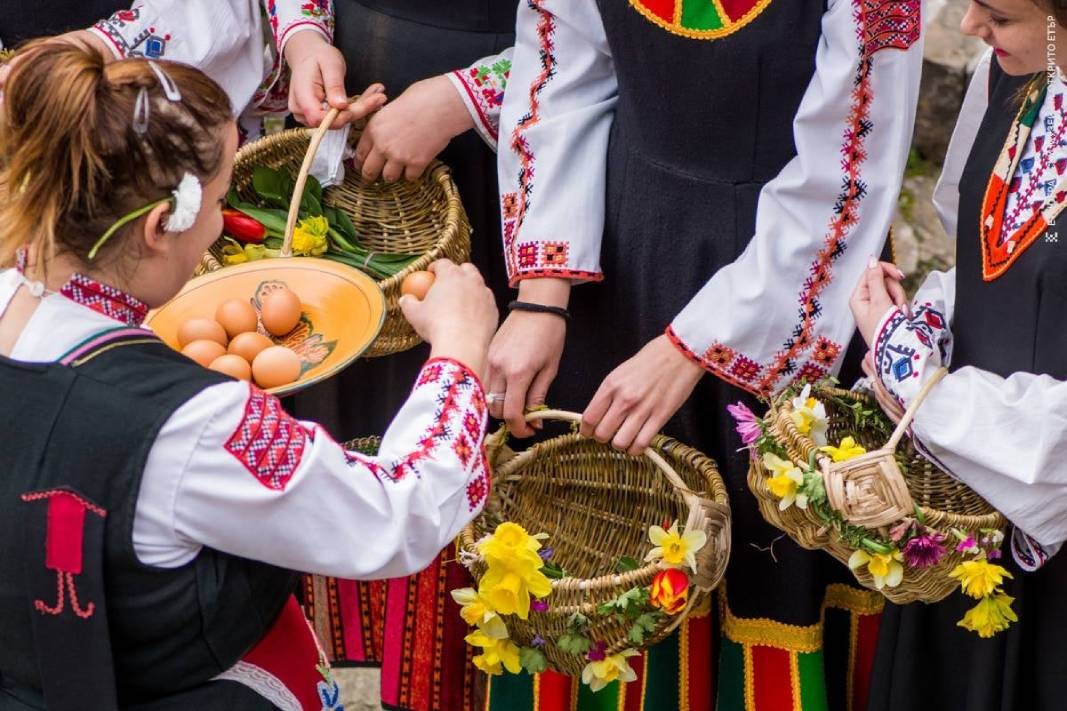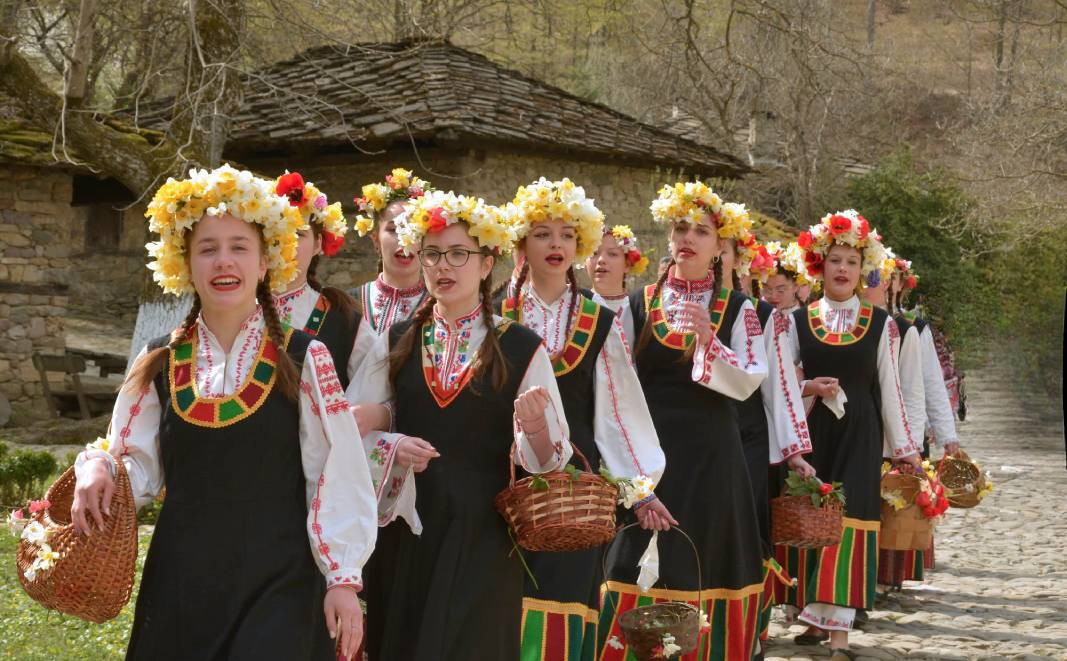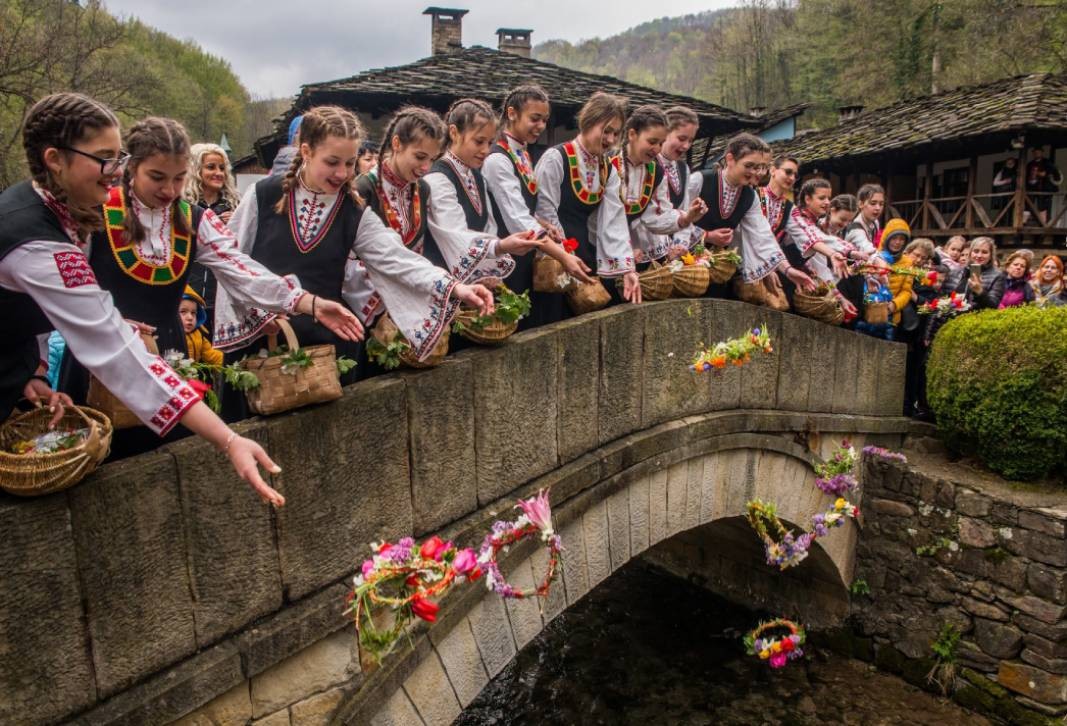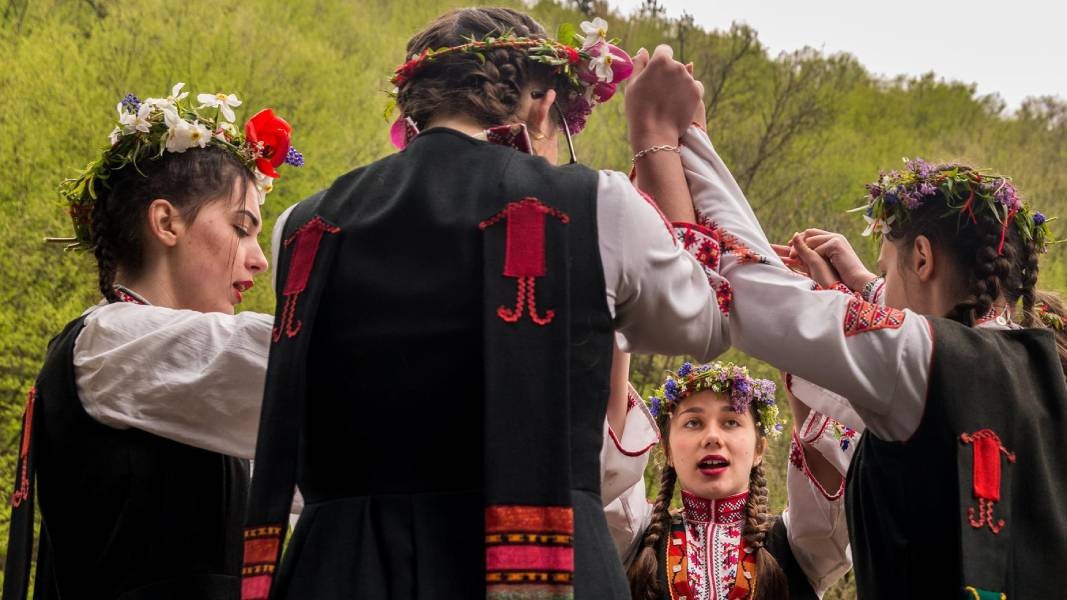Lazarus Saturday is widely known in Bulgaria as Lazarovden, celebrated by Orthodox Bulgarians on the day before Palm Sunday. The main rite is the lazaruvane - a traditional custom centred on themes of love and marriage. Girls over the age of 16, called lazarki, parade through the fields and houses, dancing and singing songs that bless the household with love, fertility, health and family well-being.
Early in the morning of Lazarovden, the girls gather in groups called cheti, each with no less than 10 girls, and begin to walk through the village.

Another interesting ritual is when the hostess welcomes the lazarki. She carries a sieve filled with wheat, takes a handful of grains and throws them over the girls who lift the hems of their skirts to catch as much wheat as possible. Then they take it home and store it in the grain barn.
The lazarki sing songs for each member of the family: for the housewife, the young maiden and the bachelor - wishing them marriage soon - for the little children and for the young bride.
Lazarovden is a girls' festival, analogous to Christmas caroling for boys, because, like caroling, lazaruvane is a rite of passage. It marks the transition from childhood to the age of marriage," explains ethnographer Mariya Boyanova from the Institute of Ethnology and Folklore Studies with the Ethnographic Museum at the Bulgarian Academy of Sciences.

"Traditionally, a girl could not be considered a maiden until she had taken part in lazaruvane. This meant that once she had already been a lazarka, she was allowed to adorn her hair with wreaths and flowers, wear jewelry, dress in an embroidered shirt, and begin courting a bachelor whom she might one day marry. Lazaruvane is an essential part of the tradition; without it, there is no true Lazarovden. It has been widespread throughout the Bulgarian countryside since traditional times.
In modern times it has undergone significant changes. During the socialist era, it was organised by schools; at that time, both girls and boys went from house to house singing songs for health and well-being. Nowadays, it is often organised by community centres or school initiatives. Children are taught the lazarki songs, but the holiday has lost its original meaning - as a rite of passage from childhood to maidenhood.

Another noticeable change is that girls now become lazarki every year, as long as someone organises it. In traditional culture, however, lazaruvane was something a girl did only once in her life.
Like Christmas carolers, the lazarki have songs with different purposes - songs for the rich farmer and for the poor farmer, for the wife of the poor farmer and for the wife of the rich farmer. They have songs for the ploughman, the shepherd, the priest, the tailor, the teacher, and indeed for all those who practise different trades within the local community.

But in all these songs there is always a wish for health and prosperity," says Mariya Boyanova, and continues:
"The main idea of the songs is to describe the maiden's hopes for marriage on the one hand, and to sing for fertility on the other. According to popular belief, Lazarus Saturday is also a holiday for the fields, pastures and forests. In fact, the songs say that Saint Lazarus goes around with a hatchet and clears the forests to make room for fields that people can cultivate. The wish is that "everything will multiply, like cattle, crops and the family in the household".
There are many flowers for this holiday - in the wreaths and in the hands of the lazarki. Ethnographer Dimitar Marinov links flowers and the garden as "living witnesses" to the longings, dreams and hopes of the maiden. That's why folk songs are often dedicated to the garden, to the rose. Flowers are always present in these songs, and Lazarus Saturday especiallly is a spring holiday," says Mariya Boyanova.

"To be a maiden symbolizes youth, freshness, and beauty, so a holiday like this could not pass without flowers. The name of the holiday comes from the veneration of St Lazarus as a saint in the Orthodox Church. On this day, the Orthodox calendar celebrates the resurrection of St Lazarus, who was brought back to life by Jesus Christ himself, a miracle performed during the earthly journey of the Saviour".
The role of the lazarki on Saturday is important. They go around the fields, and along the way, they meet many travelers and passers-by, for whom they sing songs for blessings and good wishes. Since the girls spend many hours outdoors on Lazarovden, everyone hopes for clear skies, sunny weather, and no rain.
Further reading:
On 22 November, the Association of Bulgarian Folk Ensembles Abroad (ABFEA) will present its project, 'Online Catalogue of Bulgarian Horo and Other Dances', in three European cities: Lyon, Munich and Copenhagen. 'Our goal is to preserve Bulgarian..
‘The Bulgarian horo is a kind of magic — an enchanted circle that pulses with the unique energy of our spirit, our traditions and our identity,’ says journalist Milena Milotinova, who recently presented her new documentary The Magic of the Bulgarian..
The Eastern Rhodopes come to life in the heart of Sofia – with authentic flavoуrs, music and craftsmanship . Residents of the Bulgaria capital have a chance to immerse themselves in the atmosphere of Momchilgrad Municipality and its cultural and natural..

+359 2 9336 661
